 Pak Solutions employees receiving certificates from White Mountains Community College. Courtesy photo.
Pak Solutions employees receiving certificates from White Mountains Community College. Courtesy photo.
Businesses are desperate for workers. The September Jobs Report issued by the National Federation of Independent Business, which surveys 10,000 small business owners and members, shows a record-high 51% of small business owners have job openings they could not fill. With the national quit rate hitting an all-time high of 2.8% in April and now hovering at 2.7%, more than ever, businesses are focused on retention and professional development. And that represents a huge opportunity for colleges and universities.
New Hampshire’s higher education institutions are increasing their professional development offerings and tailoring them to fill the growing skills gap. Many offer targeted, shorter-duration courses so students and workers can quickly step into new or higher positions.
Some schools are providing microcredentials, microcertifications or professional badges to get learners on the job faster. Others are partnering with local businesses to offer customized coursework or on-the-job training through apprenticeships.
Many companies are picking up the tab for these trainings.
“I think there’s a real interest these days in working with employers directly,” says Travis Willard, chief production officer at Southern NH University in Manchester.
The pandemic exacerbated existing health care worker shortage in the state, and many institutions of higher learning report high demand for licensed nursing assistants, medical assistants and other health-related programs.
Lynn Szymanski, director of workforce development at Great Bay Community College in Portsmouth, says her school offers a 12-week program in medical assisting—eight weeks in the classroom and four weeks of externship in a medical office—four times a year, with classes filled.
Alison Chisolm, director of workforce development, entrepreneurship programs and community partnerships at River Valley Community College in Claremont, Lebanon and Keene, says they offer allied health programs “as fast as we can, with as many as we can and we’re barely keeping pace.” An accelerated nursing program at Franklin Pierce University’s Manchester campus allows those with a bachelor’s degree to earn a nursing degree in as little as 18 months.
Courses in computer skills, entrepreneurship, the trades, communication skills, cyber security and education are also popular, reflecting workplace demand. Nature-based learning and climate change resiliency are among the more topical offerings.
Collaboration
Colleges and businesses are collaborating more than ever. The University of NH’s Paul College pairs UNH business school faculty with business leaders, business development experts and other faculty for executive development programs open to both companies and individuals looking to strengthen their management or leadership skills, or boost particular business skills.
UNH’s Professional Development Training Department offers certificates in everything from digital marketing to digital design to craft brewing and sponsors more than 250 one-day workshops, online courses and short-term non-credit certificate programs, as well as boot camps and conferences.
Customized training geared toward specific businesses is on the rise. When Pak Solutions in Lancaster recently restructured and some employees were moved into new roles, White Mountains Community College in Berlin provided management and training classes to help, says Kristen Miller, vice president of academic affairs at the school.
Jon Mason, corporate, community and continuing education coordinator at Nashua Community College, says they provided training on a specific machine at nearby Protolabs. “I reach out to local industry, manufacturing, for example, and find out where their skills are lacking,” he says. “Their employees might be missing a certain skill, so I try to incorporate that into our curriculum. We can adapt and pivot very quickly.”
Granite State College offers a portfolio of services to employers, including assessing corporate training programs and designing customized professional development programs. As the school focuses on working adults, it offers professional development courses online as well as in person at its Manchester campus. Rachael French, business partnerships manager at Granite State College, says companies that provide internal training have the college validate those programs so employees can earn college credit as well.
Manchester Community College partners with the International Institute in Manchester, which helps resettle immigrants and refugees, to provide an 18-week ESL (English as a Second Language) for the LNA program, per Kristine Dudley, the school’s director of workforce development. “Programs like that can open up a world of opportunities for those individuals and also for businesses,” she says.
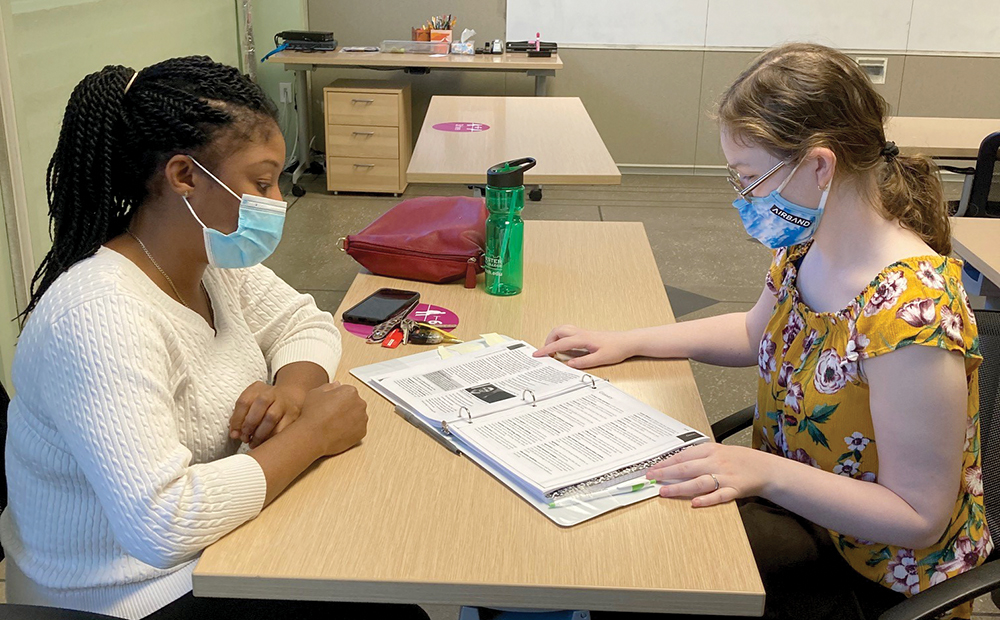
A student in the Manchester Community College ESL skills for health care program. Courtesy photo.
Meeting Specific Needs
Ann McClellan, interim provost and vice president of academic affairs at Plymouth State University, says the school created an undergraduate major, the electromechanical technology robotics program, in 2019 that educates students to build and design automation systems. The program combines hands-on learning with the theoretical and critical thinking needed to support industry partners across the region, she says. In partnership with White Mountains Community College, Plymouth State also offers a North Country Teacher Certification Program, with much of it taught hybrid, to help meet the disproportionate shortage of teachers in the North Country.

A student in a robotics program at Plymouth State University. Courtesy photo.
Colby-Sawyer College in New London focuses on “experiential learning,” says Jennifer Tockman, director of career development and BOLD Women’s Leadership Network. For example, the Community Engaged Learning program matches an employer with a class and students design, create and produce “something deliverable” for that employer, such as a logo for the company.
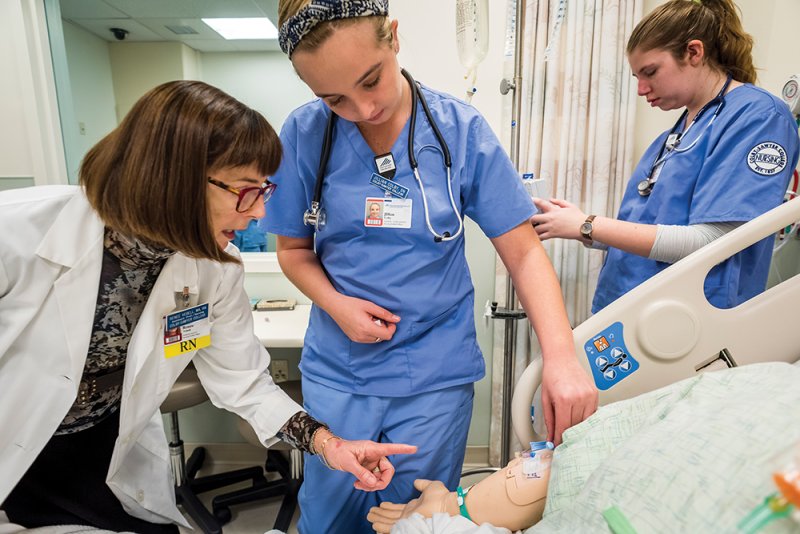 The nursing program at Colby-Sawyer College. Courtesy photo.
The nursing program at Colby-Sawyer College. Courtesy photo.
The school’s nursing program works with Dartmouth-Hitchcock Medical Center, where students do their clinical work. Colby-Sawyer also works with the Lake Sunapee Region Chamber of Commerce and often sponsors a “network night,” where students could mingle with “real-life industry folks,” Tockman says.
Heather LaDue, executive director of the Center for Professional Development and Partnership at Franklin Pierce University in Rindge and Manchester, designs “custom learning solutions” based on what employers tell her they need.
Willard says the trend at Southern NH University is to teach skills or competencies that align with employers’ needs so that “you’re focused not only on what you need to learn to qualify for that job, but you’ll also have marketable skills you can carry with you…. In traditional higher ed, you get a degree and hope there will be a demand, so it’s a very different value we offer.”
Kim Eckenrode, career and technical education pathways director at Nashua Community College, notes the popularity of the school’s 18-week front-end and back-end coding bootcamps, which help students gain an entry-level job or enhance their skills quickly. Increasingly, employers are willing to pay for both credit and non-credit courses, she adds, “so they can promote from within.”
Through its business partnership program, Franklin Pierce offers a 20% discount for online courses for employees and their immediate family members, which is “a nice value-add for employers who can’t afford tuition reimbursement,” says LaDue. A 40% discount is offered to anyone currently unemployed.
Antioch University New England in Keene, which is known for its teaching programs, has also seen increased demand in certain courses, in part because of the pandemic. Shelley L. Viles, director of the Centers, Institutes and Projects at the school, says interest is up in certificates in Nature-Based Early Childhood Education, which helps educators learn how to teach outside. Also popular are courses in Environmental Studies and Sustainability, such as the Climate Resilience Certificate for Professionals, which prepares students to ensure infrastructure will be resilient when climate incidents occur, she says.
McClellan at Plymouth State reports heightened demand for courses in cyber security and library media, preparing students for work in school libraries. The class includes coursework on digital skills, digital literacy, disinformation and credibility of sources and “is one of our fastest-growing master’s degree programs,” she says.
With trade workers in demand, Chisolm at River Valley says courses in fields like plumbing are also filling fast, with 67 signed up for plumber’s licensing classes.
Great Bay Community College offers a 20-hour manufacturing course that runs continuously at the Rochester campus, “so if a company doesn’t have a group of people to make it affordable, they can hire somebody with no experience and put them in that program so they can get the foundational skills before they hit the manufacturing floor,” says Szymanski.
And with more people launching their own companies, River Valley offers a series of workshops and entrepreneurship programs that have attracted more than 250 participants to date, Chisolm says. A 12-week program for entrepreneurs wanting to go “from idea to opening” and another for businesses in the early stages are launching Nov. 1, with scholarships available, she adds.
Granite State College, seeing increased demand for frontline workers in nursing and fire service, and a need for leadership and continuous training in those fields, introduced in January two new degree programs: the Bachelor of Science in Fire Service Administration and the Master of Science in Nursing Health Care Education. To meet demand for shorter, skills-enhancing programs overall, it also introduced graduate certificates in Health Care Management, Nonprofit Leadership, Project Management and Administration of Online Education for Adult Learners.
Students on the Job
Internships and apprenticeships are another way in which colleges and businesses are collaborating. Colby-Sawyer students are required to complete at least one internship before graduating, with students gaining experience at places ranging from WMUR-TV to Fidelity Investments to Tufts Medical Center.
Franklin Pierce’s internship program with C&S Grocers, which leads the list of the Top 100 Private Companies in NH, “is a good recruitment tool for C&S and a win-win for our students in the business program,” says LaDue. Franklin Pierce also offers apprenticeships in which employers hire high school graduates and provide on-the-job training while students complete their degree.
 A Franklin Pierce student interning at C&S Grocers in Keene. Courtesy photo.
A Franklin Pierce student interning at C&S Grocers in Keene. Courtesy photo.
Another “earn while you learn” program is offered by Manchester Community College, which partners with health care providers, NHTI-Concord’s Community College and Great Bay Community College. “Employers are seeing it as an opportunity to attract talent and it provides such an opportunity for people who want to change careers,” says Dudley.
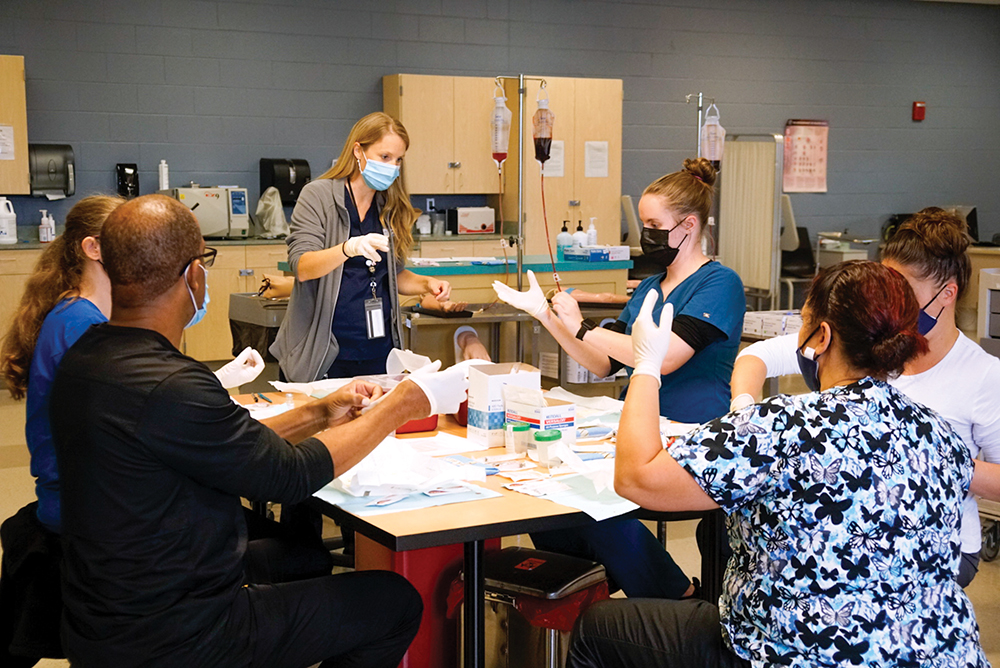
Manchester Community College students in the “earn while you learn” program. Courtesy photo.
Earning Badges
Microcredentials and digital badges help students learn specific, job-related skills quickly, usually with the potential to apply credits to full certifications or degrees later.
Earlier this year, Szymanski at Great Bay began working with all seven of the state’s community colleges to launch a short-term digital badge, or digital credentialing program “for learners to showcase their accomplishments in these short-term programs.” A code behind the badge details the institution where the learning took place, a description of the course and the learning outcome the student achieved. “The badge is put into a digital wallet, or backpack, and it becomes almost like a digital resume,” says Szymanski, who adds the badge can be shown to an employer or admissions counselor or posted on social media. As an example, she says, White Mountains Community College issued NH Promise badges to restaurant workers who undertook training in safe, healthy COVID practices.
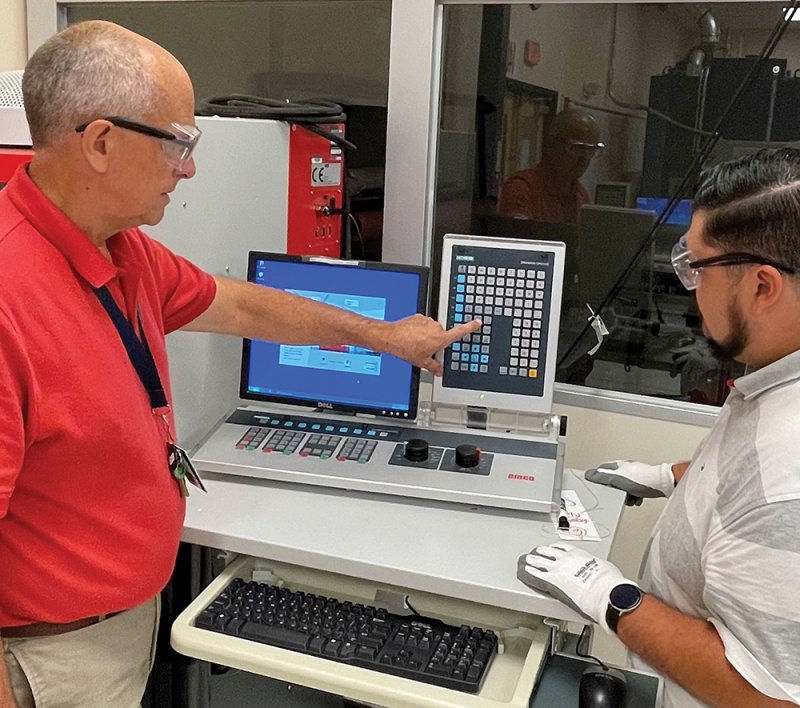 A faculty member with a manufacturing student at Great Bay Community College. Courtesy photo.
A faculty member with a manufacturing student at Great Bay Community College. Courtesy photo.
Eckenrode at Nashua Community College says students who complete microelectronics or coding boot camps are awarded professional badges to show they have graduated with those competencies.
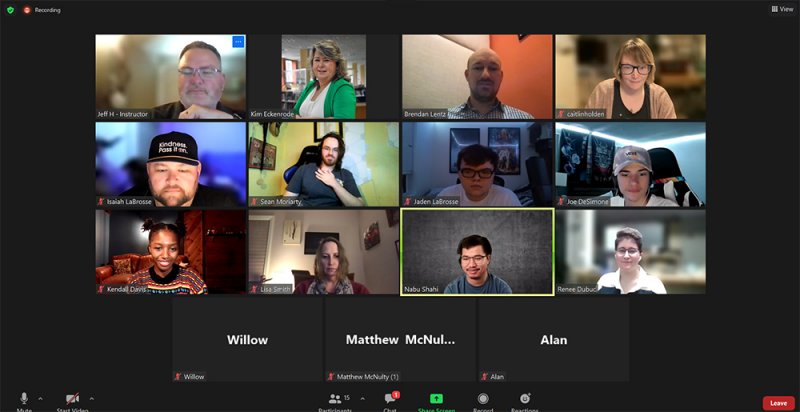
Students participating in an online coding bootcamp through Nashua Community College. Courtesy photo.
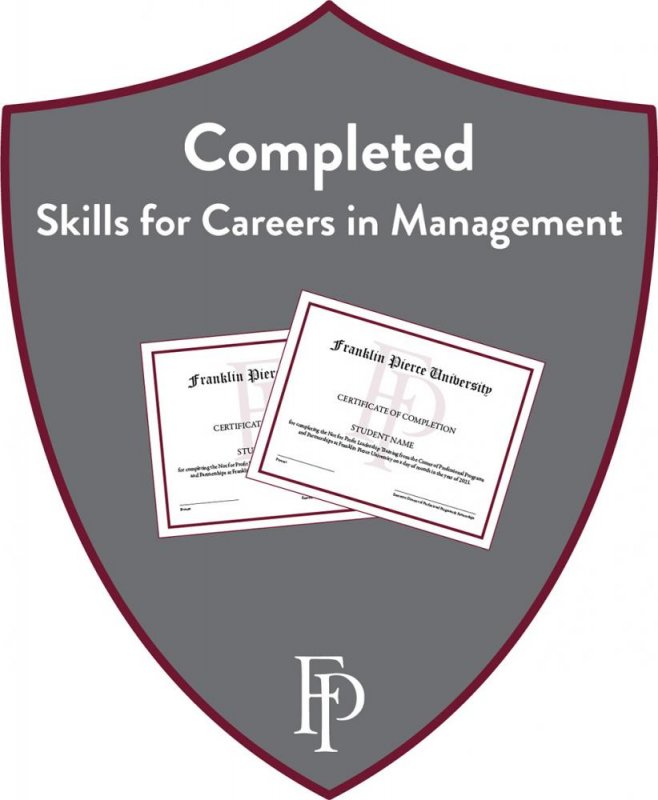 LaDue says Franklin Pierce has developed a badging program (pictured) for professional development for the city of Manchester’s Public Works Department that allows employees to study at their own pace and earn digital badge skills in such areas as understanding the roles of manager versus supervisor, applicable field skills, and basic computer skills and apply them instantly on the job. The certificate they receive at the end is worth three college credits toward an associate degree.
LaDue says Franklin Pierce has developed a badging program (pictured) for professional development for the city of Manchester’s Public Works Department that allows employees to study at their own pace and earn digital badge skills in such areas as understanding the roles of manager versus supervisor, applicable field skills, and basic computer skills and apply them instantly on the job. The certificate they receive at the end is worth three college credits toward an associate degree.
This fall and winter, Granite State College is offering a series of self-paced workshops intended to address skills gaps and focus on Microsoft Excel, visual communications and budget management, requiring anywhere between 15 to 40 hours over six weeks. Participants earn a digital badge upon completion. This past summer it began offering a five-week micro-credential for pre-K-12 educators that also comes with a digital badge. The grant-funded training was offered on behalf of the NH Department of Education, which included a $300 stipend. The winter cohort will receive $100.
Teaching Soft Skills
Classes in communication and “soft skills” are also popular, in part because employers have requested them, college officials say. “When we talk to employers on a regular basis, the things they’re looking for are skills like problem solving, creativity, adaptability,” says Tockman at Colby-Sawyer. “Within our classes, we try to offer experiences that allow students to build all those skills.”
Mason at Nashua Community College says businesses have asked about basic skills like showing up on time, knowing how to pay attention and safety, and he incorporates them into the curriculum.
Soft skills are also included in many in-house professional development programs like those offered to staff members at Dartmouth College, according to Jennifer Cocklin, manager of learning and development at the school. Dartmouth offers a certification program for administrative staff and a nine-month, cohort-driven leadership program for potential high performers across campus. Workshops are offered on embracing change, change management and stress management, and Cocklin’s team offers a guided meditation workshop. Other offerings explore such topics as tips for engaging with others that have different working styles, how to effectively communicate and how to delegate.
“Learning and development is something that is core to the success of any organization,” Cocklin says.
Demand to Remain High
As for the future, college officials foresee continued demand for health-related and entrepreneurship programs, continued interest in computer skills, more customized coursework and partnering with industry, and more short-term training opportunities.
McClellan at Plymouth State anticipates more demand for interpreters, sustainable business models and coursework related to tourism and natural resource preservation.
Remote or hybrid learning is here to stay, many say. “A focus on skills is also going to be a trend,” says Szymanski.

 Current Issue - April 2024
Current Issue - April 2024